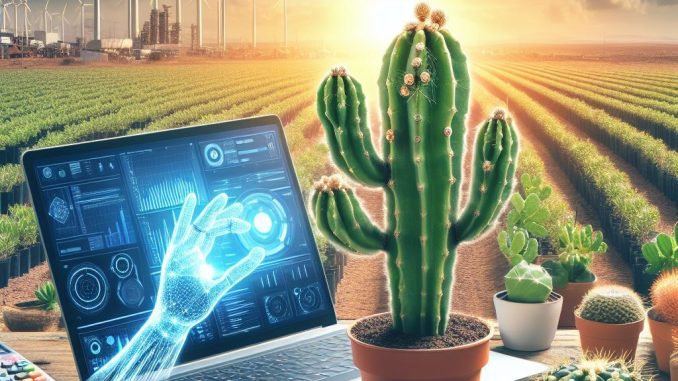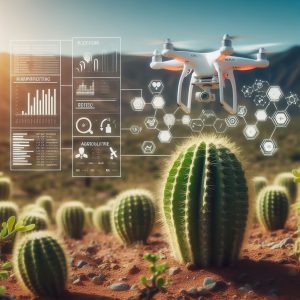
Cactus AI: Revolutionizing Agriculture through Artificial Intelligence
The agriculture world has witnessed a transformative journey, evolving from traditional farming practices to adopting cutting-edge technologies. Integrating artificial intelligence (AI) has been pivotal to these advancements. In this article, we delve into the revolutionary impact of Cactus AI, exploring its functionality, benefits, challenges, and the way forward for sustainable agriculture.
Introduction
Definition of Cactus AI
Cactus refers to a revolutionary agricultural technology that brings together the power of AI to optimize and change several aspects of farming. This cutting-edge system is designed to enhance agrarian practices’ efficiency, productivity, and sustainability by leveraging advanced algorithms and data analytics.
At its core, Cactus collects and analyzes data from diverse sources, including sensors, satellites, and historical farming data. This comprehensive data analysis allows farmers to gain real-time insights into crop conditions, resource utilization, and potential challenges such as pests or diseases.
The primary goal of Cactus is to empower farmers with actionable information, enabling them to make informed decisions in areas such as irrigation, fertilization, and pest control. By providing precise and timely recommendations, Cactus optimizes resource management, reduces environmental impact, and ultimately increases crop yields.
In essence, Cactus represents a transforming power in agriculture, where integrating artificial intelligence with traditional farming practices leads to a more sustainable and futuristically advanced approach to food production.

The Importance of AI in Agriculture
The importance of artificial intelligence (AI) in agriculture cannot be overstated, as it emerges as a crucial tool in addressing the evolving challenges faced by the global farming community. Here are vital aspects highlighting the significance of AI in agriculture:
Precision Farming:
AI enables precision farming by providing farmers with real-time data and insights about their crops. This precision allows for targeted irrigation, fertilization, and pest control interventions, optimizing resource usage and minimizing waste.
Increased Efficiency:
Automation through AI streamlines various farming processes, reducing farmers’ manual workloads. Planning, harvesting, and monitoring can be efficiently managed, increasing productivity.
Data-Driven Decision Making:
AI processes enormous quantities of data from sensors, satellites, and historical records. This data-driven approach empowers farmers to make better decisions, increasing their ability to respond promptly to changing conditions and challenges.
Crop Monitoring and Management:
AI facilitates advanced crop monitoring, allowing farmers to detect early signs of infections, lack of nutrients, or pest infestations. This proactive approach enables timely intervention, minimizes crop losses, and improves yield.
Resource Optimization:
Farmers can optimize essential resources such as water, fertilizers, and pesticides through AI algorithms. This reduces costs and contributes to sustainable farming practices by minimizing environmental impact.
Predictive Analytics:
AI’s predictive capabilities help farmers anticipate crop performance, market trends, and potential challenges. This foresight allows for better planning and risk management, ensuring a more stable and resilient agricultural system.
Innovative Machinery and Automation:
AI-driven machinery and robotics are increasingly being integrated into agriculture. These technologies can autonomously perform tasks like planting and gathering, freeing up manual labour for more strategic and complex decision-making.
Crop Diversity and Biodiversity Conservation:
AI supports the cultivation of various crops by providing tailored recommendations for different plant species. This contributes to biodiversity in agriculture, promoting a more resilient and sustainable ecosystem.
Global Food Security:
As the world population continues to grow, the need for food increases. AI in agriculture plays a pivotal role in meeting this demand by maximizing productivity, minimizing losses, and ensuring efficient food production on a global scale.
Continuous Innovation and Adaptation:
AI in agriculture is not static; it continually evolves to address emerging challenges. This adaptability ensures farmers can access the latest technologies and methodologies, keeping agriculture at the forefront of innovation.
Evolution of Agriculture Technology
Traditional Farming Methods
Traditionally, agriculture relied on manual labour and basic farming techniques. The evolution of technology gradually introduced machinery and automation.
Role of Technology in Agriculture
Technology integration revolutionized farming, introducing precision agriculture, data analytics, and innovative farming techniques.
Emergence of Cactus AI
Cactus AI emerged as a response to the increasing complexity of modern agriculture. It harnesses the power of AI to increase productivity and sustainability.
Understanding Cactus AI
How Cactus AI Works
Cactus AI operates through advanced algorithms that analyze data from multiple sources, including sensors, satellites, and historical farming data.
Benefits for Farmers
Farmers benefit from real-time insights, enabling them to make informed decisions about irrigation, implantation, and pest control.
Integration with Precision Farming
Cactus AI seamlessly integrates with precision farming techniques, optimizing resource utilization and minimizing environmental impact.
Advantages of Cactus AI in Agriculture
Improved Crop Monitoring
Cactus AI enables detailed crop monitoring and identifies potential diseases, nutrient deficiencies, or pest infestations.
Resource Optimization
Farmers can optimize aid usage, reducing water and plant food waste and reducing expenses and environmental viability.
Pest and Disease Management
The AI system detects early signs of pest or disease outbreaks, allowing for proactive measures and minimizing crop losses.
Real-Life Success Stories
Case Study 1: Increased Yield in XYZ Farm
XYZ Farm experienced a significant increase in crop yield after implementing Cactus AI, showcasing its positive impact on productivity.
Case Study 2: Sustainable Farming with Cactus AI
A farm adopted Cactus AI for sustainable practices, reducing environmental impact and increasing profitability.
Challenges and Solutions
Data Security Concerns
The collection of vast amounts of farming data raises concerns about data security. Robust encryption and privacy measures are crucial to addressing these issues.
Overcoming Implementation Challenges
Farmers may face challenges in implementing Cactus AI. Comprehensive training programs and support systems are essential to ensure smooth adoption.
Continuous Improvement in AI Algorithms
Regular updates and improvements in AI algorithms are necessary to keep pace with evolving agricultural practices and challenges.
Future Prospects
Potential Developments in Cactus AI
Anticipated advancements include:
- Enhanced machine learning algorithms.
- Better data integration.
- Increased compatibility with diverse farming systems.
Impact on Global Agriculture
The widespread adoption of Cactus AI is poised to revolutionize global agriculture, contributing to food security and sustainable farming practices.

The Human Touch in Agriculture
Balancing AI and Farmer Expertise
While AI enhances efficiency, preserving farmers’ invaluable experience and expertise is crucial for balancing technology and tradition.
Collaborative Farming Models
The integration of AI fosters collaboration among farmers, creating a network for sharing insights and collectively addressing challenges.
Cactus AI Adoption Worldwide
Current Trends
Global trends indicate a rising adoption of Cactus AI, with farmers recognizing its potential to transform agricultural practices and increase yields.
Global Initiatives and Partnerships
International collaborations and initiatives aim to promote the widespread adoption of Cactus AI, fostering a global community focused on sustainable agriculture.
Sustainability and Environmental Impact
Cactus AI and Sustainable Agriculture
The eco-friendly features of Cactus AI contribute to sustainable agriculture, aligning with measures to increase the impact of agriculture.
Reducing Environmental Footprint
Cactus AI is pivotal in reducing agriculture’s environmental footprint by optimizing resource usage and minimizing waste.
Farmers’ Perspective on Cactus AI
Interviews and Opinions
Insights from farmers who have embraced Cactus AI shed light on its practical benefits and challenges faced during implementation.
Acceptance and Challenges Faced
Understanding the acceptance levels and addressing challenges is essential for the extensive acceptance and success of Cactus AI in diverse farming communities.
Cactus AI in Crop Diversity
Applications in Various Crops
Cactus AI is versatile, offering applications across various crops, from grains to fruits, showcasing its adaptability in diverse farming scenarios.
Promoting Biodiversity in Agriculture
The integration of cacti supports biodiversity by optimizing farming practices and ensuring a balance between crops and ecosystems.
Regulatory Framework
Government Policies on AI in Agriculture
Governments worldwide are developing policies to regulate the use of AI in agriculture, ensuring ethical and responsible practices.
Ethical Considerations
Addressing ethical concerns related to AI in agriculture involves transparent communication, adherence to guidelines, and continuous moral evaluations.
Overcoming Misconceptions
Addressing Common Myths
Dispel misconceptions surrounding cacti by providing precise and accurate information and promoting informed decision-making among farmers and stakeholders.
Clarifying Concerns About Cactus AI
Clear communication channels and educational programs help address concerns and foster trust among farmers and the community.
Conclusion
Recap of Cactus AI Advantages
Cactus is a transformative force in agriculture, offering improved efficiency, sustainability, and increased yields for farmers worldwide.
The Future Landscape of Agriculture
As we embrace the era of intelligent farming, Cactus paves the way for a future where technology and human expertise coexist to ensure food security and environmental sustainability.
FAQs
Is cactus suitable for small-scale farmers?
Cactus can be adapted for small-scale farming, providing benefits for resource optimization and crop management.
How does Cactus address environmental concerns in agriculture?
Cactus reduces environmental impact by optimizing resource usage, minimizing waste, and promoting sustainable farming practices.
Are there any privacy concerns related to Cactus data collection?
Robust encryption and privacy measures are implemented to address data security concerns and protect farmers’ information.
What is the role of farmers in the era of Cactus?
Farmers play a crucial role in balancing AI technology with their traditional expertise, ensuring a harmonious coexistence for optimal results.
How can farmers overcome challenges in implementing Cactus?
Comprehensive training guides and continuous support are essential for farmers to overcome hurdles and maximize the benefits of Cactus AI.
Click here to read our other articles.

Leave a Reply